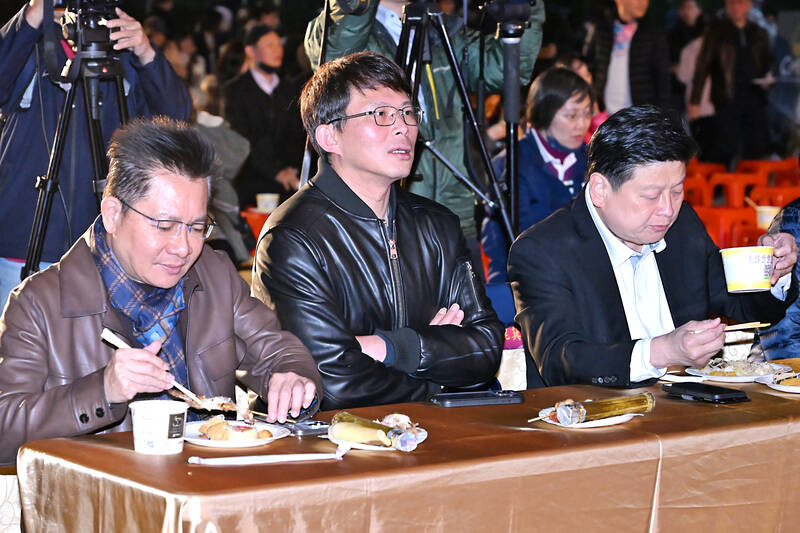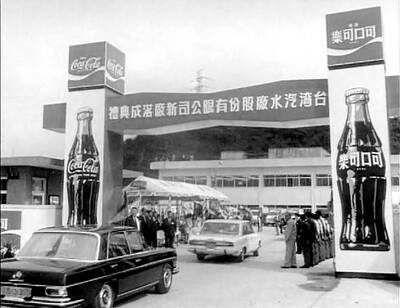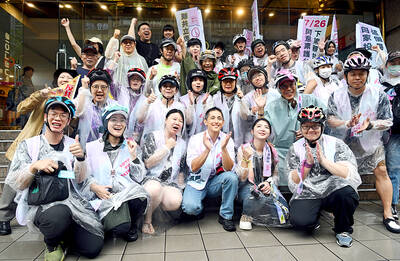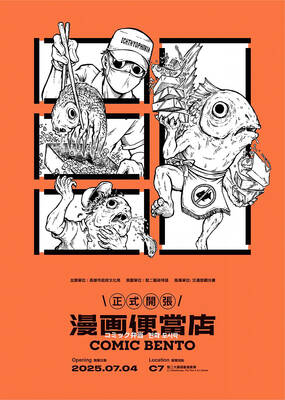The resignation of Taiwan People’s Party (TPP) co-founder Ko Wen-je (柯文哲) as party chair on Jan. 1 has led to an interesting battle between two leading party figures, Huang Kuo-chang (黃國昌) and Tsai Pi-ru (蔡壁如). For years the party has been a one-man show, but with Ko being held incommunicado while on trial for corruption, the new chair’s leadership could be make or break for the young party.
Not only are the two very different in style, their backgrounds are very different. Tsai is a co-founder of the TPP and has been with Ko from the very beginning. Huang has only been in the party 14 months, yet he has dominated press coverage and Ko anointed him acting chairman.
The election is scheduled for Feb. 15, with the results to be announced and the chair’s term to start on Feb. 19.

Photo courtesy of Tsai Pi-ru’s Facebook page
Tsai has fleshed out her positions a bit in the past few days, including pledging to step aside if Ko can resume his duties and to negotiate with the Chinese Nationalist Party (KMT) in a “coffee meeting 2.0” to ensure no repeat of the meltdown of talks in the last election to run a joint presidential ticket.
The situation is not looking good for Tsai. While she won a seat on the party’s central committee, she only came fifth out of nine.
Then on Jan. 22 the process for getting online votes to vouch for the candidates was launched. It took one minute for Huang to get the minimum 300 votes required. Tsai had to wait for eight hours.

Photo: Chen Yi-kuan, Taipei Times
In the Jan. 23 edition of this column we examined the unusual path to political prominence of Tsai Pi-ru, the “mother of the TPP.” In this column we will examine Huang’s very different path.
SUNFLOWER PROMINENCE
Huang Kuo-chang came to national attention for playing a leading role in the 2014 Sunflower movement, a 23-day protest to block the KMT from ramming through legislation that would have opened Taiwan’s economy to Chinese dominance.
Hundreds of thousands of people came out to show support during the standoff, which in the end was successful.
He cut a striking figure at the time, looking handsome and resolute. Nowadays, as a legislator and the TPP’s caucus convener, he is frequently accused of helping that very same KMT ram through bills without properly engaging in consultation with the Democratic Progressive Party (DPP).
Today he is fond of dressing in spiffy, dark business suits. Most other male lawmakers wear party-branded windbreakers or vests, or a button-down shirt and jacket, but rarely a tie.
Huang likes to rail against what he perceives as injustices. He claims his dream job would be Justice Minister, but temperamentally I doubt it would suit him because he could no longer be a perpetual indignation machine.
NEW POWER PARTY
Prior to 2010, Huang was mostly known as a legal scholar. In the early 2010s he started to appear in the news for overtly political activities.
Though during the Sunflower movement he expressed some skepticism about elements in the DPP, most of his energies were pro-Taiwan and directed against the KMT.
He was involved in an unsuccessful campaign to recall a KMT lawmaker, and grew to more prominence in the anti-media monopoly movement that opposed efforts during the Ma Ying-jeou (馬英九) era to buy out and consolidate local media under deep blue or pro-China ownership, especially the Want Want China Times group.
The Sunflower movement brought awareness to Chinese infiltration, Ma’s efforts to lay the groundwork for eventual unification and popularized a stronger sense of Taiwanese pride. This shifted the political mainstream closer to the positions held by the DPP, leading to a string of landslide victories by the pan-green camp.
He was also more left-wing. This included taking a stand against the death penalty, which in Taiwan has an approval rating that might be higher than that of beef noodles. He’s since backed away from that position.
In January of 2015 a group of well-known activists — including Huang — formed the New Power Party (NPP). The party is very pro-Taiwan and to the left of the DPP.
In 2016 he won a legislative seat in New Taipei City, but faced a recall campaign over his pro-marriage equality stance, which was more controversial at the time. Those in favor of ousting him outnumbered those wanting him to stay in office, but the total number of votes did not meet the necessary threshold.
He was elected party chair and served in that role for nearly three years. His tenure got a fair number of poor reviews, with terms like “arrogant,” “self-righteous,” “overbearing” and “autocratic” being bandied about.
During his tenure, he made efforts to stand out from the DPP to avoid being perceived as a subservient “little green” party, though on certain key issues such as protecting sovereignty they voted with the DPP.
‘WHAT HAPPENED TO HUANG KUO-CHANG?’
Today, Huang Kuo-chang is very different. I have frequently heard people asking “What happened to Huang Kuo-chang?”
As the TPP caucus convener, under Huang’s leadership the party has only rarely shown any independence from the KMT and on almost all substantial issues votes in lockstep. This includes on bills that potentially could harm Taiwan’s security, including some small cuts to the defense budget and a large budget freeze for the military.
His positions have moved closer to Ko Wen-je’s, who could be considered more center-right. For example, Ko voted against marriage equality during a referendum and has frequently made comments that disparage women and other groups. How much of this Huang agrees with is unclear, but he has not taken any stand against Ko in response.
So, what did happen to Huang Kuo-chang?
After stepping down as NPP party chair in 2019 he drifted away from the party and joined the TPP in November 2023. Whether it was gradual or came quickly is hard to say, but there was a seismic shift in Huang’s thinking.
He has developed an almost pathological hatred of the DPP.
Several possibilities come to mind. One is that he is a contrarian and by nature pits himself against those in power. That would fit with his constant indignation.
Another is he may have had some run-ins with the DPP that left him feeling frustrated or angry. That the ruling party might treat a smaller party arrogantly is a distinct possibility.
He also seems to have developed a conspiratorial mindset, imagining President William Lai (賴清德) and his New Tide faction conspiring with prosecutors to persecute political enemies. That is theoretically possible, but it is unlikely that Lai would take such huge risks for a smaller player like Ko.
It is also possible that this is simply about power. He is using the TPP as a vehicle as a growing movement as the NPP shrank, and working with the KMT means participating in exercising power.
More likely it is a bit of all of the above.
Donovan’s Deep Dives is a regular column by Courtney Donovan Smith (石東文) who writes in-depth analysis on everything about Taiwan’s political scene and geopolitics. Donovan is also the central Taiwan correspondent at ICRT FM100 Radio News, co-publisher of Compass Magazine, co-founder Taiwan Report (report.tw) and former chair of the Taichung American Chamber of Commerce. Follow him on X: @donovan_smith.

July 28 to Aug. 3 Former president Chiang Kai-shek (蔣介石) reportedly maintained a simple diet and preferred to drink warm water — but one indulgence he enjoyed was a banned drink: Coca-Cola. Although a Coca-Cola plant was built in Taiwan in 1957, It was only allowed to sell to the US military and other American agencies. However, Chiang’s aides recall procuring the soft drink at US military exchange stores, and there’s also records of the Presidential Office ordering in bulk from Hong Kong. By the 1960s, it wasn’t difficult for those with means or connections to obtain Coca-Cola from the

Taiwan is today going to participate in a world-first experiment in democracy. Twenty-four Chinese Nationalist Party (KMT) lawmakers will face a recall vote, with the results determining if they keep their jobs. Some recalls look safe for the incumbents, other lawmakers appear heading for a fall and many could go either way. Predictions on the outcome vary widely, which is unsurprising — this is the first time worldwide a mass recall has ever been attempted at the national level. Even meteorologists are unclear what will happen. As this paper reported, the interactions between tropical storms Francisco and Com-May could lead to

A couple of weeks ago the parties aligned with the People’s Republic of China (PRC), the Chinese Nationalist Party (KMT) and the Taiwan People’s Party (TPP), voted in the legislature to eliminate the subsidy that enables Taiwan Power Co (Taipower) to keep up with its burgeoning debt, and instead pay for universal cash handouts worth NT$10,000. The subsidy would have been NT$100 billion, while the cash handout had a budget of NT$235 billion. The bill mandates that the cash payments must be completed by Oct. 31 of this year. The changes were part of the overall NT$545 billion budget approved

It looks like a restaurant — but it’s food for the mind. Kaohsiung’s Pier-2 Art Center is currently hosting Comic Bento (漫畫便當店), an immersive and quirky exhibition that spotlights Taiwanese comic and animation artists. The entire show is designed like a playful bento shop, where books, plushies and installations are laid out like food offerings — with a much deeper cultural bite. Visitors first enter what looks like a self-service restaurant. Comics, toys and merchandise are displayed buffet-style in trays typically used for lunch servings. Posters on the walls present each comic as a nutritional label for the stories and an ingredient